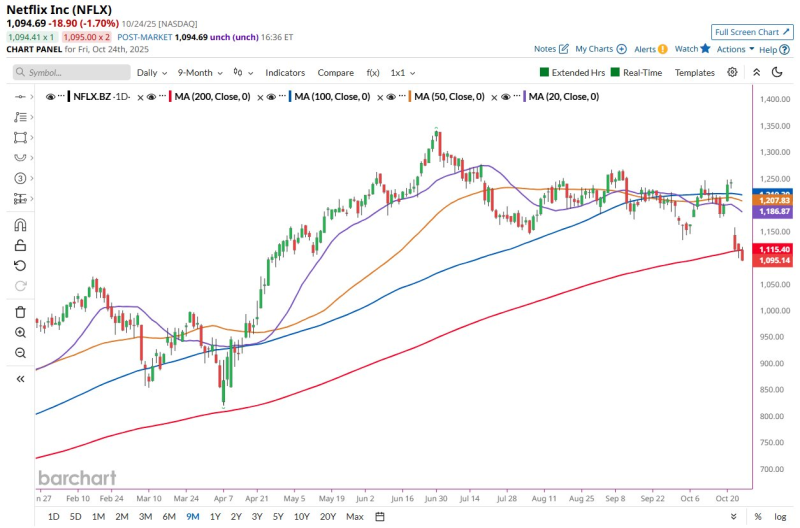● Netflix ($NFLX) is in rough shape technically, and traders are starting to worry. According to Barchart, the streaming giant has broken below its 20-day, 50-day, 100-day, and 200-day moving averages—all at once. When you see all four of these key technical levels breach simultaneously, it's rarely a good sign. As of October 24, 2025, Netflix closed at $1,094.69, down 1.70% for the day, continuing a slide that started after the stock failed to hold above $1,200 earlier this month.

● Here's what's happening: both short-term and long-term momentum have turned negative. When all the major moving averages are pointing down at the same time, it usually means sellers are in control. Technical analysts warn that this kind of setup often leads to more selling pressure unless the stock can quickly bounce back above at least one of these levels. The danger here is that once these technical lines break, algorithmic trading systems and institutional investors tend to pile on, potentially accelerating the downside.
● But the technical picture isn't the only thing worth watching. Netflix was supposed to be one of the safer bets in entertainment and tech, but that narrative is getting tested. Sure, subscriber numbers have held up and revenue growth has been steady through 2025, but there's no getting around the fact that content costs keep rising, competition keeps getting fiercer, and the broader economy isn't exactly helping. If this weakness continues, don't be surprised to see money flow out of Netflix and into hotter sectors like AI and semiconductors, which have been crushing it lately.
● The breach of the 200-day moving average around $1,115 is particularly significant. For technical traders, the 200-day MA is often seen as the dividing line between a healthy stock and one in trouble. When a stock loses all its major support levels at once—especially on rising volume—it typically signals that sentiment has shifted from bullish to neutral or even bearish. And right now, that's exactly what Netflix is dealing with.
 Peter Smith
Peter Smith

 Peter Smith
Peter Smith


